Secularism is the principle of seeking to conduct human affairs based on naturalistic considerations, uninvolved with religion.

Secular humanism is a philosophy, belief system or life stance that embraces human reason, logic, secular ethics, and philosophical naturalism while specifically rejecting religious dogma, supernaturalism, and superstition as the basis of morality and decision making.

School prayer, in the context of religious liberty, is state-sanctioned or mandatory prayer by students in public schools. Depending on the country and the type of school, state-sponsored prayer may be required, permitted, or prohibited. The United Kingdom also requires daily worship by law, but does not enforce it. Countries which prohibit or limit school prayer often differ in their reasons for doing so. In the United States, school prayer cannot be required of students in accordance with the Establishment Clause of the First Amendment to the United States Constitution. This is generally rigorously applied in public schools; the Establishment Clause does not prevent prayer in private schools that have no public funding. In Canada, school-sponsored prayer is disallowed under the concept of freedom of conscience as outlined in the Canadian Charter on Rights & Fundamental Freedoms. School-sponsored prayer is disallowed in France as a byproduct of its status as a secular nation.

The National Secular Society (NSS) is a British campaigning organisation that promotes secularism and the separation of church and state. It holds that no one should gain advantage or disadvantage because of their religion or lack of it. It was founded by Charles Bradlaugh in 1866.
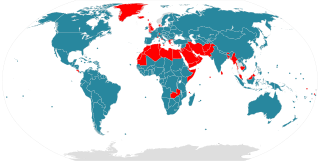
A secular state is an idea pertaining to secularity, whereby a state is or purports to be officially neutral in matters of religion, supporting neither religion nor irreligion. A secular state claims to treat all its citizens equally regardless of religion, and claims to avoid preferential treatment for a citizen based on their religious beliefs, affiliation or lack of either over those with other profiles.
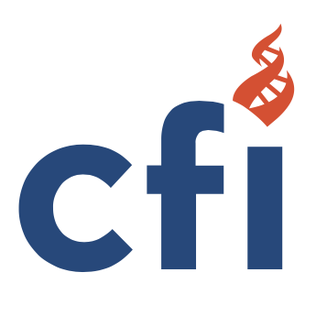
The Center for Inquiry (CFI) is a U.S. nonprofit organization that works to mitigate belief in pseudoscience and the paranormal and to fight the influence of religion in government.
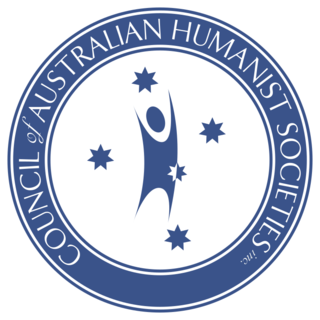
The Council of Australian Humanist Societies (CAHS) is an umbrella organisation for Australian humanist societies. It was founded in 1965. It is affiliated with Humanists International. The official symbol of CAHS is the Happy Human.

Religion in Nepal encompasses a wide diversity of groups and beliefs. Nepal is a secular nation, and secularism in Nepal under the interim constitution is defined as "religious and cultural freedom, along with the protection of religion and culture handed down from time immemorial." That is, "the state government is bound for protecting and fostering Hindu religion" while maintaining "religious" and "cultural" freedom throughout the nation as fundamental rights.
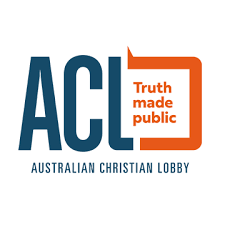
The Australian Christian Lobby (ACL) is a conservative right-wing Christian advocacy organisation based in Canberra.
Saba Mahmood (1961–2018) was professor of anthropology at the University of California, Berkeley. At Berkeley, she was also affiliated with the Center for Middle Eastern Studies, Institute for South Asia Studies, and the Program in Critical Theory. Her scholarly work straddled debates in anthropology and political theory, with a focus on Muslim majority societies of the Middle East and South Asia. Mahmood made major theoretical contributions to rethinking the relationship between ethics and politics, religion and secularism, freedom and submission, and reason and embodiment. Influenced by the work of Talal Asad, she wrote on issues of gender, religious politics, secularism, and Muslim and non-Muslim relations in the Middle East.
FamilyVoice Australia is a conservative Christian organisation. It was known as Festival of Light Australia from 1973 to 2008. Its stated mission was to be "a Christian ministry to the nation, promoting true family values in the light of the wisdom of God". The name was changed to FamilyVoice Australia on 1 July 2008 in order to eliminate confusion with the many other festivals or groups around the world called "Festival of Light" or "Festival of Lights". Key activities of FamilyVoice Australia are providing information to supporters, churches and community leaders and lobbying on issues of concern.
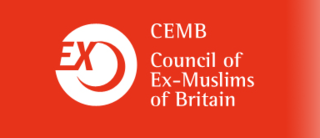
The Council of Ex-Muslims of Britain or CEMB is the British branch of the Central Council of Ex-Muslims. It was launched in Westminster on 22 June 2007.
The United Nations categorizes Bangladesh as a moderate democratic Muslim country. Sunni Islam is the largest and most dominant religion practiced in the country. In the Constitution of Bangladesh, Islam is referred to twice in the introduction and Part I of the constitution. The document begins with the Islamic phrase Bismillahir Rahmanir Raheem which in English is translated as "In the name of Allah, the Beneficent, the Merciful" and article (2A) declares that:"Islam is the state religion of the republic".

Atheism, agnosticism, scepticism, freethought, secular humanism or general irreligion are increasing in Australia. Post-war Australia has become a highly secularised country. Religion does not play a major role in the lives of much of the population.

The Institute for the Study of Secularism in Society and Culture (ISSSC) is located at Trinity College in Hartford, Connecticut. ISSSC was established in 2005 to advance the understanding of the role of secular values and the process of secularization in contemporary society and culture. Designed to be multidisciplinary and nonpartisan, the Institute conducts research, lectures and public events.
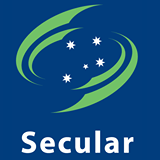
The Secular Party of Australia is a minor Australian political party, founded in January 2006 and registered as a federal political party in 2010. It aims to promote secular humanist ethical principles and the separation of church and state in Australia.

The Australian Catholic Bishops’ Conference (ACBC) is the national episcopal conference of the Catholic bishops of Australia and is the instrumentality used by the Australian Catholic bishops to act nationally and address issues of national significance. Formation of the ACBC was approved by the Holy See on 21 June 1966. With around 5.4 million Catholics in Australia, the ACBC is an influential national body.

Secularism in Bangladesh is known as "neutrality of religion" under Bangladeshi law. In the Constitution of Bangladesh, secularism is mentioned in the preamble as one of the fundamental principles of Bangladeshi law. Article 8 enshrines secularism as one of the fundamental principles of state policy. Article 12 elaborates further on secularism and freedom of religion.
The secular movement refers to a social and political trend in the United States, beginning in the early years of the 20th century, with the founding of the American Association for the Advancement of Atheism in 1925 and the American Humanist Association in 1941, in which atheists, agnostics, secular humanists, freethinkers, and other nonreligious and nontheistic Americans have grown in both numbers and visibility. There has been a sharp increase in the number of Americans who identify as religiously unaffiliated, from under 10 percent in the 1990s to 20 percent in 2013. The trend is especially pronounced among young people, with about one in three Americans younger than 30 identifying as religiously unaffiliated, a figure that has nearly tripled since the 1990s.
Christian democracy of the type found in Europe never gained a strong presence in Australia. While sectarianism was an important factor in Australian politics in the early 20th century it was only a single element in political divisions at the time, with Roman Catholics along with the Irish tending to be drawn towards the left-wing Australian Labor Party, while Protestants were grouped alongside the British in the various anti-Labor conservative parties of the time.














